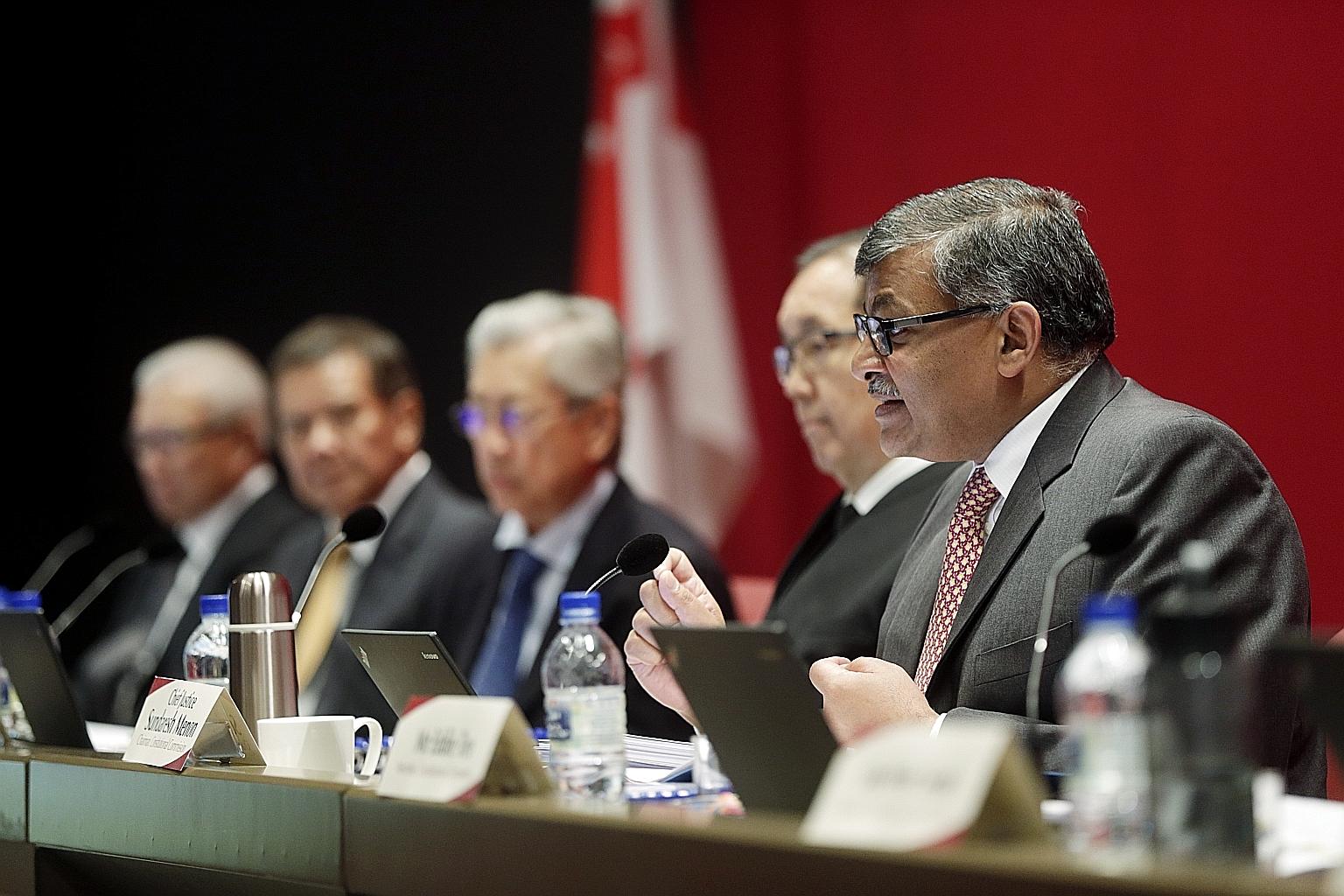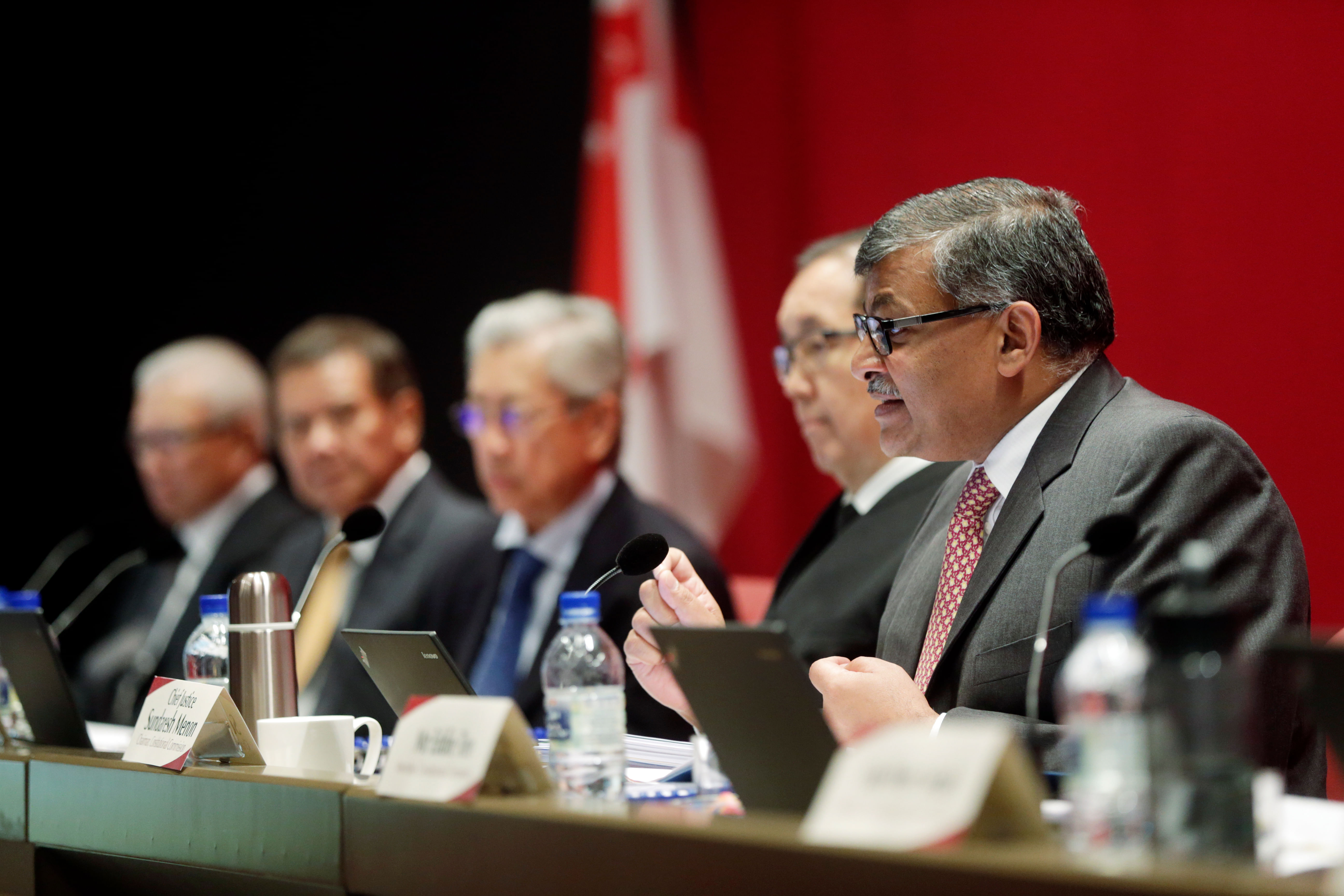From the gallery
Proposal for elected senate? Moment for debate has passed, but bigger questions remain
Sign up now: Get ST's newsletters delivered to your inbox

Chief Justice Sundaresh Menon speaking at a Constitutional Commission hearing on the elected presidency in May. The WP's submission to the commission in March did not mention a senate.
ST FILE PHOTO
Janice Heng
Follow topic:
It was supposed to be the second day of debate on proposed constitutional amendments concerning the elected presidency.
Yet, a good chunk of yesterday's sitting was taken up by an entirely different proposal: to revert to a ceremonial appointed president, and have an elected senate to protect the reserves.
That was the idea put forward by the Workers' Party (WP) and elaborated on by seven of its MPs and Non-Constituency MPs in their speeches yesterday.
They also called for a national referendum so citizens could choose between the Government's proposal and the WP's.
Of course, suggesting alternatives to government policy is a natural and important role for opposition MPs to play. The WP has made much about wanting to keep its powder dry and said it would present its views on reform of the elected presidency only when the issue came for debate in Parliament.

Yet, arguably the WP's proposal yesterday seemed to come too late to have any meaningful impact.
Including the idea in its submission to the Constitutional Commission, say, could have allowed the commission to consider it.
The WP's submission to the commission in March included strong arguments against the elected presidency and mentioned the possibility of reverting to an appointed one.
But it did not set out a detailed alternative or mention a senate. This seems like a missed opportunity.
Mr Edwin Tong (Marine Parade GRC) from the People's Action Party (PAP) pointed out as much in his speech, saying: "(The WP) had every opportunity of having their views considered and taken into account by the commission, put into the commission report, tabled in the White Paper and for this House to consider."
Unfortunately, it did not do so.
Alternatively, if the WP had simply made its idea public earlier, that would have allowed the idea of a ceremonial president and an elected senate to become part of the wider public debate on the issue.
Yesterday, the WP MPs raised philosophical issues surrounding the nature of the presidency.
They noted, for instance, the inherent tension between the president's symbolic role as a unifying figure and the contentious process of standing for election - something that the Constitutional Commission had also flagged.
Earlier in his speech, Prime Minister Lee Hsien Loong touched on the alternatives that had been considered and rejected, including one that came close to the WP proposal: to have a ceremonial, unelected president and vesting the powers of the second key in the Council of Presidential Advisers (CPA).
"And if we were to elect the CPA, it would in effect become an Upper House," he said.
"Instead of just one national election to elect a president, we would have elections for six, eight or 10 presidential advisers," he added. The process would risk becoming politicised, and "the problem will be amplified, not reduced".
Nevertheless, the WP did raise important points that deserve to be debated.
Yet, as Minister of State for Communications and Information, and Education Janil Puthucheary pointed out, the moment - for the debate that the WP wanted to have - has passed.
The House is not debating whether to retain an elected presidency, but the proposed changes to the elected presidency.
Nevertheless, ruling party MPs chose to devote much time to engaging the WP on its proposal in excruciating detail.
No fewer than 10 PAP MPs stood up to pose "supplementary questions" on the minutiae of the senate idea. They included at least four office-holders, including Law and Home Affairs Minister K. Shanmugam.
They had questions on everything from the criteria for shortlisting senate candidates to the schedule for senate elections, and whether these would be staggered.
Perhaps it made political sense for them to scrutinise the WP's proposal for weaknesses, or attempt to expose the WP as under-prepared.
But it did seem a bit of a sideshow for so much time to be spent picking apart a proposal that had not been put on the table till so late in the day.
After one such round of clarification, WP chief Low Thia Khiang (Aljunied GRC) said: "Let's have some debate on the fundamental (issues), the pros and cons of having a senate and an elected presidency. Don't be bogged down by details."
The bigger point is that the moment for such a debate has passed.
But if PAP MPs had wished to object to the WP's proposal nonetheless, then perhaps it would have been more fruitful to engage the party on the philosophical issues.
Questions about the nitty-gritty details of the WP's senate idea apply only to that specific proposal.
But there are bigger questions, not least about how to handle the tension between the elected president's symbolic role and the electoral process, which apply even if the WP's proposal is taken off the table. These deserved more airtime.

